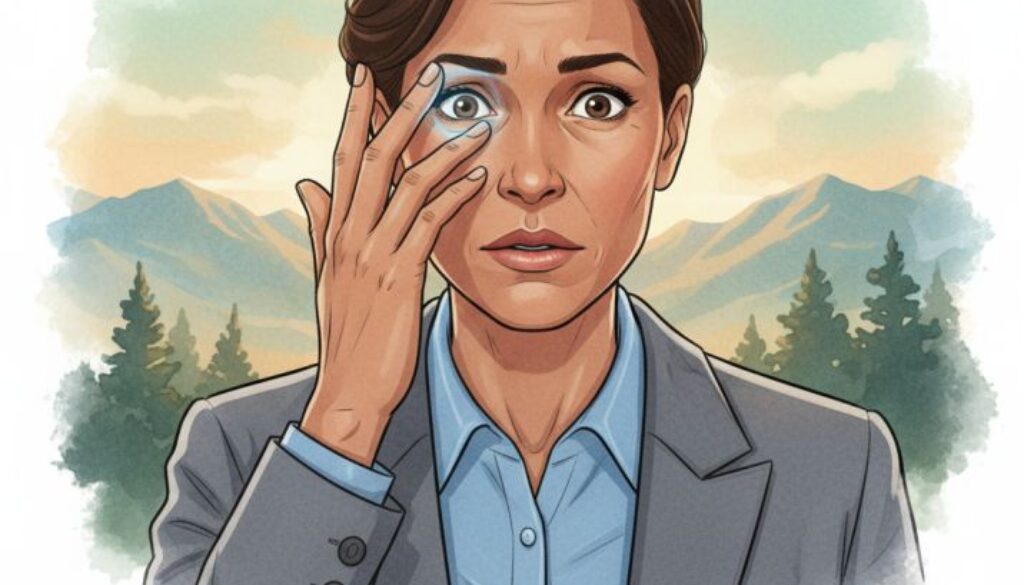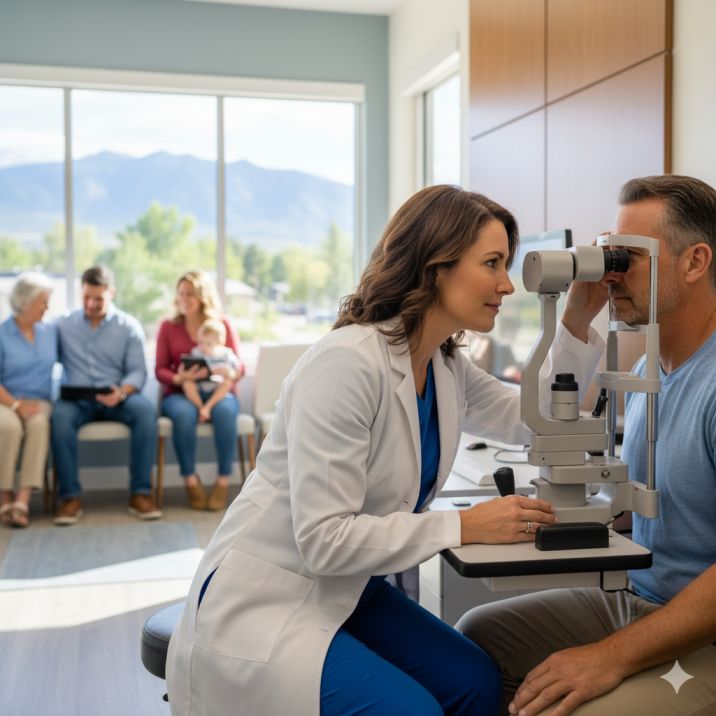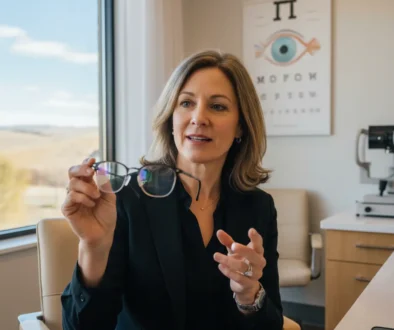Sudden Vision Loss Emergency Guide | Fort Collins Eye Care
When you experience sudden vision loss in Fort Collins, every moment matters. Whether you’re reading to your grandchildren, driving down Harmony Road, or enjoying the mountain views that make our community home, your vision connects you to everything you love. At Poudre Valley Eyecare, we want you to understand that sudden vision loss is always a medical emergency requiring immediate attention.
🚨 Emergency Alert: Sudden vision loss can happen in seconds to minutes and requires emergency care within hours to preserve your sight. If you’re experiencing sudden vision changes right now, call 911 or visit the nearest emergency room immediately.
Understanding Sudden Vision Loss: What Every Fort Collins Family Should Know
Sudden vision loss means a swift, usually unexpected, loss of the ability to see well or to see at all, happening within seconds, minutes, or even over a few days. Unlike the gradual vision changes that come with age, sudden vision loss represents an urgent medical situation that can affect anyone at any time.
Immediate Warning Signs of Vision Emergency
Seek Emergency Care Immediately If You Experience:
- Complete or partial vision loss in one or both eyes
- A curtain-like shadow falling across your vision
- Sudden blurry vision that doesn’t clear with blinking
- New flashing lights or an increase in eye floaters
- Seeing halos around lights with sudden vision changes
- Severe eye pain with nausea or vomiting
Types of Sudden Vision Loss
Complete Vision Loss: Total blackout of vision in one or both eyes
Partial Vision Loss: Loss of central or peripheral vision
Sudden Blurry Vision: Rapid onset of unclear or distorted vision
Critical Reminder: Even if your vision returns quickly on its own, you still need an emergency evaluation. Temporary vision loss can signal an impending stroke or indicate serious eye conditions that may worsen without treatment.
Leading Causes of Sudden Vision Loss: Northern Colorado Emergency Guide
Life-Threatening Conditions Requiring Immediate Care
1. Central Retinal Artery Occlusion (Eye Stroke)
This occurs when a blood clot or piece of atherosclerotic material blocks the major artery supplying your retina. Like a stroke in the brain, this condition can cause permanent vision loss within hours if not treated immediately.
Treatment Window: Best outcomes within 4-6 hours
2. Retinal Detachment
The signs include flashes of light, dark shadows, and a sudden increase in floaters, requiring emergency surgical repair to avoid irreversible vision loss. Many of our Fort Collins patients describe it as “a curtain being pulled across my vision.”
Treatment Window: Earlier treatment leads to better visual outcomes
3. Acute Angle-Closure Glaucoma
This occurs when there’s a sudden increase in eye pressure, causing severe eye pain, vomiting, and seeing halos around lights. This is a true emergency requiring immediate treatment to prevent permanent damage.
Treatment Window: Permanent damage can occur within hours
4. Giant Cell Arteritis
This condition affects people older than 50 and causes inflammation in the linings of arteries, particularly those in the head, triggering vision loss that can result in permanent blindness within weeks without treatment.
5. Optic Neuritis
Inflammation of the optic nerve can lead to sudden, temporary vision loss, often accompanied by pain during eye movement and commonly associated with multiple sclerosis.
Stroke-Related Vision Loss: A Fort Collins Priority
A stroke occurs when blood flow to part of the brain is blocked by a clot or when a blood vessel bursts. If it affects the part of the brain responsible for vision, it can cause sudden blurry vision, double vision, or vision loss in one or both eyes.
Stroke Statistics: Every 40 seconds, someone in the United States has a stroke (CDC, 2025).
Additional stroke warning signs include:
- Sudden weakness or numbness on one side of the body
- Difficulty speaking or understanding speech
- Sudden severe headache
- Loss of balance or coordination
When Sudden Blurry Vision Signals Danger
Not all sudden blurry vision represents the same level of emergency, but certain combinations of symptoms require immediate attention:
Emergency Situations:
- Sudden blurry vision with weakness or numbness on one side of the body
- Blurred vision accompanied by paralysis, dizziness, or trouble talking
- Severe eye pain with nausea and vomiting
- Complete loss of vision in one or both eyes
- Sudden increase in floaters with flashes of light
Recent Medical Breakthroughs in Vision Loss Research
Pediatric Vision Discovery (2025)
Recent research from China has identified a novel retinal disorder in children called hyperacute outer retinal dysfunction (HORD), characterized by sudden bilateral vision loss following high fever illness. This discovery helps explain some previously mysterious cases of sudden vision loss in children.
Medication-Related Vision Loss Alert
Recent 2024-2025 studies have identified links between popular GLP-1 medications like semaglutide (Ozempic, Wegovy) and a rare but serious eye condition called non-arteritic anterior ischemic optic neuropathy (NAION). The European Medicines Agency concluded in June 2025 that NAION is a “very rare” side effect of semaglutide medications, affecting up to 1 in 10,000 people taking the drug.
Technology Advances in Emergency Eye Care
By 2025, AI-powered algorithms will revolutionize diagnostics by analyzing retinal images to detect early signs of conditions like diabetic retinopathy, age-related macular degeneration, and glaucoma with high precision, enabling early intervention to prevent severe vision loss.
Emergency Response: What to Do If You Experience Sudden Vision Loss
Immediate Action Steps:
- Don’t Panic, But Act Fast: Call 911 or go to an emergency room immediately
- Avoid Touching Your Eyes: Don’t rub or apply pressure to your eyes
- Document Your Symptoms: Note when it started and any associated symptoms
- Bring Your Medications: List all current medications and supplements
- Contact Poudre Valley Eyecare: For urgent follow-up care coordination
What to Expect During Emergency Care
Medical History and Physical Exam
Your healthcare provider will ask detailed questions about when the vision loss started, associated symptoms, and your medical history.
Diagnostic Tests May Include:
- Comprehensive eye examination with dilation
- Blood tests measuring inflammation and platelet count
- Ultrasound if the retina isn’t clearly visible during examination
- Gadolinium-enhanced MRI of the orbit and brain for certain symptoms
- Neurological testing to rule out stroke
Treatment Options: How We Restore Your Vision in Fort Collins
Treatment depends entirely on the underlying cause of your sudden vision loss:
Immediate Medical Interventions:
Medications:
- Eye drops, tablets, or injections, depending on the condition
- Steroids to treat inflammation
- Blood pressure medications for vascular causes
- Anti-clotting medications for embolic events
Surgical Interventions:
- Emergency retinal reattachment surgery
- Iridotomy procedure for acute angle-closure glaucoma
- Procedures to improve blood flow to the optic nerve
- Vitrectomy for severe vitreous hemorrhage
Advanced Therapies: Recent advances include laser treatments, anti-VEGF injections for certain retinal conditions, and novel neuroprotective therapies currently in clinical trials.
Prevention: Protecting Your Vision for Life in Northern Colorado
While not all sudden vision loss can be prevented, you can significantly reduce your risk:
Essential Eye Care Schedule
At Poudre Valley Eyecare, we follow current guidelines: comprehensive eye exams every 2-4 years for adults ages 40-54, every 1-3 years for ages 55-64, and every 1-2 years for those 65 and older. Those with risk factors like diabetes or a family history of eye disease should have annual exams.
Managing Underlying Health Conditions
- Control Diabetes: Diabetic retinopathy occurs when blood vessels in the retina begin bleeding, and if the vessels burst, you could have sudden vision loss
- Monitor Blood Pressure: High blood pressure increases the risk of retinal artery and vein occlusions.
- Heart Health: Cardiovascular disease increases the risk of embolic events affecting vision
- Medication Management: Regular review with healthcare providers
Lifestyle Modifications for Vision Protection
- Wear safety equipment when needed, such as during work or sports activities.
- Practice good hand hygiene and avoid touching your eyes to prevent infection.
- Maintain a healthy diet rich in omega-3 fatty acids and antioxidants
- Don’t smoke – smoking significantly increases the risk of vision-threatening conditions
- Manage stress through healthy coping mechanisms
Special Considerations for Fort Collins Families
Age-Related Risk Factors
Young Professionals (25-40): Focus on preventing digital eye strain and managing work-related stress that could trigger ocular migraines. Be aware of sudden vision changes, especially if accompanied by headache or neurological symptoms.
Established Families (35-65): Begin monitoring for age-related changes, manage diabetes and hypertension effectively, ensure children receive proper vision screening, and maintain regular comprehensive eye exams.
Active Seniors (65+): Increase monitoring frequency, watch for symptoms of macular degeneration and glaucoma, manage multiple medications that could affect vision, and be particularly vigilant for giant cell arteritis symptoms.
When to Seek Routine vs. Emergency Care
Schedule Regular Appointments For:
- Gradual vision changes over weeks or months
- New onset of mild floaters without flashing lights
- Difficulty with night vision that develops slowly
- Digital eye strain symptoms
- Routine preventive care
Seek Emergency Care For:
- Any sudden vision loss or change
- New flashing lights with increased floaters
- Severe eye pain with nausea
- Vision loss with stroke symptoms
- Curtain-like shadows across vision
Why Choose Poudre Valley Eyecare for Your Vision Emergency
Quarter-Century of Trusted Emergency Care
For over 25 years, we’ve been Fort Collins’ trusted partner in vision health emergencies. Our experience with acute eye conditions means we know how to quickly identify and manage vision-threatening situations, providing the expertise you need when every second counts.
Comprehensive Emergency Services
- Immediate evaluation of sudden vision changes
- Advanced diagnostic equipment for rapid assessment
- Coordination with emergency services and specialists when needed
- Follow-up care to monitor recovery and prevent future episodes
- 24/7 emergency consultation available
Accessible Care When You Need It Most
We accept Medicare and Medicaid because we believe everyone deserves access to emergency eye care. Our convenient Fort Collins location ensures you can get the care you need quickly, without barriers.
Family-Centered Emergency Approach
We understand that vision emergencies affect the whole family. Our caring team provides clear explanations, emotional support, and coordinates with your other healthcare providers for comprehensive care during stressful situations.
The Critical Time Window: Why Minutes Matter
Vision loss affects more than 7 million Americans (based on 2017 CDC data showing approximately 7 million people with vision loss or blindness), with newer estimates from 2023 indicating over 51 million adults experience some level of vision difficulty. In many cases of sudden vision loss, there’s a critical window of opportunity for treatment:
- Retinal Artery Occlusion: Best outcomes when treated within 4-6 hours, though some benefit may occur up to 24 hours
- Acute Angle-Closure Glaucoma: Permanent damage can occur within hours
- Retinal Detachment: Earlier treatment leads to better visual outcomes
- Stroke-Related Vision Loss: Immediate treatment can prevent further damage
Looking Forward: The Future of Emergency Eye Care in Fort Collins
The landscape of eye care is undergoing rapid evolution, with AI-powered diagnostics, gene therapy for inherited retinal disorders, and stem cell therapy showing promise for vision restoration by 2025. At Poudre Valley Eyecare, we stay current with these advances to offer our Fort Collins patients the best possible outcomes.
Emerging Technologies:
- Artificial Intelligence: Enhanced diagnostic accuracy for retinal conditions
- Telemedicine: Remote consultation capabilities for initial assessment
- Gene Therapy: Treatment for previously untreatable inherited conditions
- Regenerative Medicine: Stem cell therapy for optic nerve and retinal repair
Take Action: Your Vision Emergency Plan
Create a Personal Vision Emergency Plan:
- Know the warning signs of sudden vision loss
- Keep Poudre Valley Eyecare’s emergency contact information readily available
- Understand your insurance coverage for emergency care
- Identify the nearest emergency room with ophthalmology services
- Maintain an updated list of all medications
- Share this plan with family members
Emergency Contact Information:
- Sudden Vision Loss: Call 911 or visit your nearest emergency room immediately
- For Urgent Eye Care Questions: Contact Poudre Valley Eyecare
- Non-Emergency Appointments: Schedule through our convenient online system
Scientific References and Additional Resources
This article is based on current medical literature and authoritative health organizations. Here are three key resources that informed our content:
1. Centers for Disease Control and Prevention (CDC) – Stroke Facts
Source: CDC Division for Heart Disease and Stroke Prevention
Link: https://www.cdc.gov/stroke/data-research/facts-stats/index.html
Key Information: Current stroke statistics, including the “every 40 seconds” data, stroke warning signs, and emergency response guidelines. Updated July 2025.
2. American Academy of Ophthalmology – Eye Disease Screening Guidelines
Source: American Academy of Ophthalmology Clinical Guidelines
Link: https://www.aao.org/eye-health/tips-prevention/screening
Key Information: Comprehensive adult medical eye evaluation recommended frequencies by age group, baseline screening at age 40, and risk factor considerations. Updated 2024-2025.
3. European Medicines Agency – NAION Risk Assessment for Semaglutide
Source: EMA Pharmacovigilance Risk Assessment Committee (PRAC)
Link: https://www.ema.europa.eu/en/news/prac-concludes-eye-condition-naion-very-rare-side-effect-semaglutide-medicines-ozempic-rybelsus-wegovy
Key Information: Official determination that NAION is a “very rare” side effect (1 in 10,000) of semaglutide medications, issued June 2025.
Additional Resources for Patients:
- National Eye Institute: https://www.nei.nih.gov/learn-about-eye-health/eye-conditions-and-diseases
- American Foundation for the Blind: https://www.afb.org/research-and-initiatives/statistics
- World Health Organization Vision Reports: https://www.who.int/health-topics/blindness-and-vision-loss
Conclusion: Every Second Counts for Your Vision
Sudden vision loss is a medical emergency that requires immediate attention. Whether you’re experiencing complete vision loss, sudden blurry vision, or any concerning visual changes, time is critical. Every minute counts when it comes to preserving your sight, and prompt evaluation by eye care professionals can help prevent permanent damage.
At Poudre Valley Eyecare, we’re here to protect your vision when emergencies strike. Our 25+ years of experience, advanced diagnostic capabilities, and commitment to accessible care make us your trusted partner in vision health. Don’t wait – if you’re experiencing sudden vision changes, seek immediate medical attention.
Your vision connects you to everything you love about life in Northern Colorado. Let us help you protect it.
FAQs
-
Sudden vision loss is any noticeable decrease in vision that develops rapidly—within seconds, minutes, hours, or a few days—affecting one or both eyes. It can be partial, complete, painful, or painless and always requires immediate medical attention.
Please note: None of the above should be considered medical advice. If you’re having any concerns about your vision, please reach out to us immediately or see your primary care provider.





